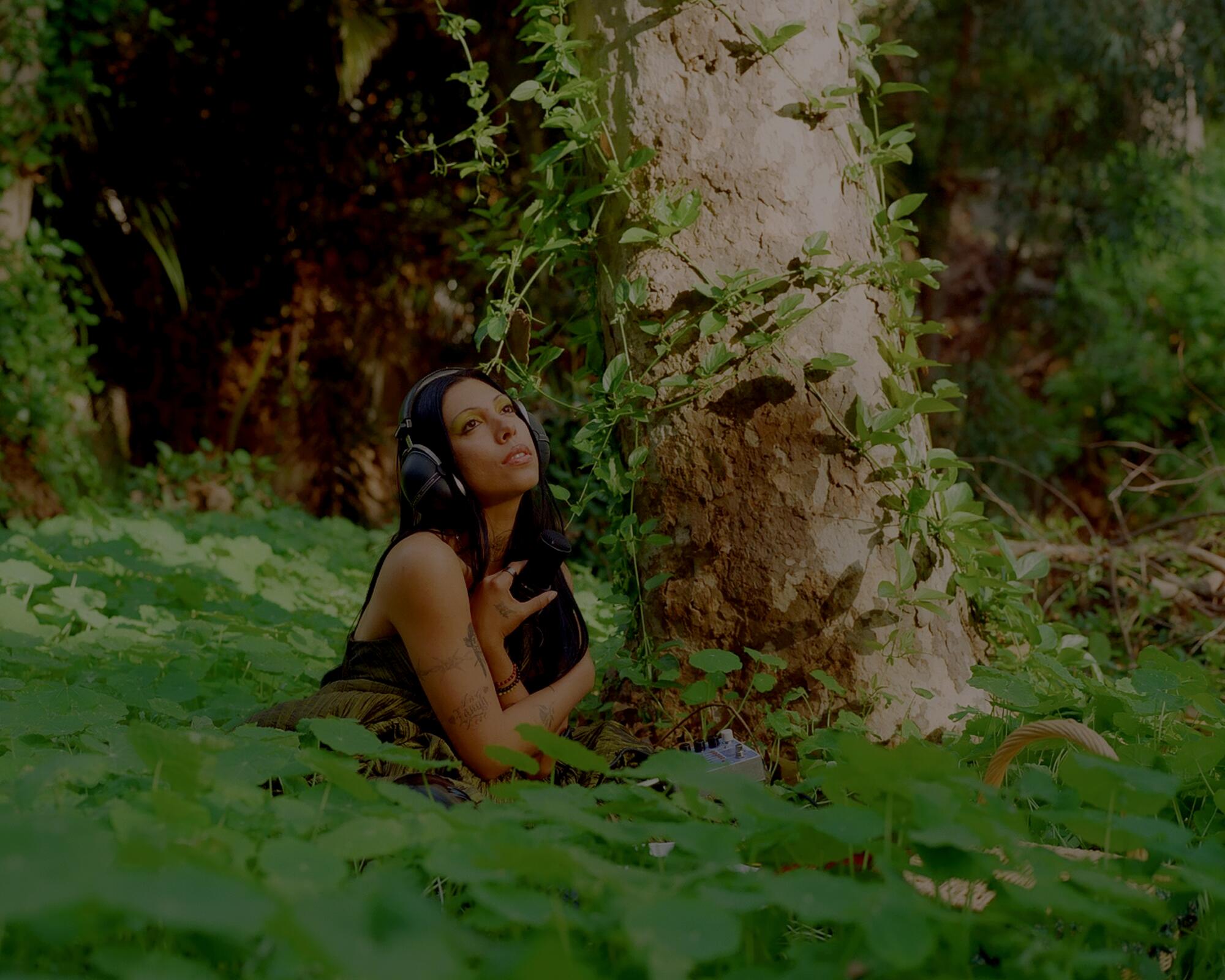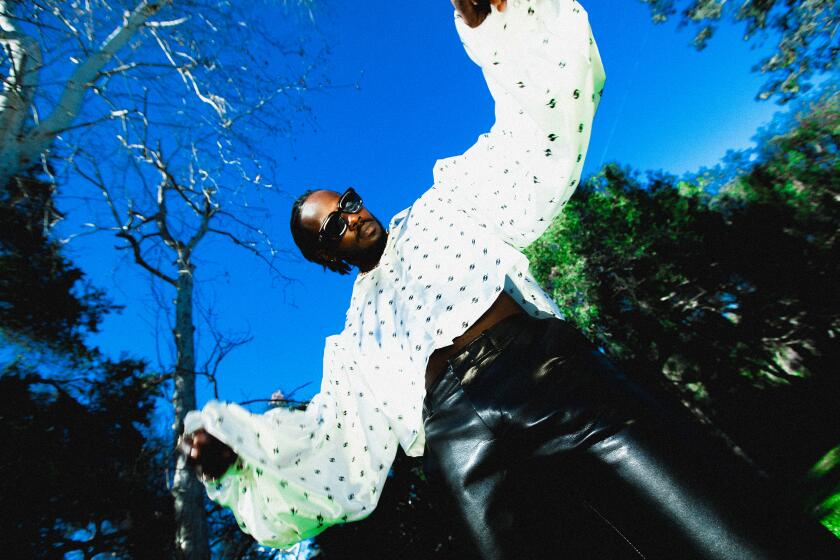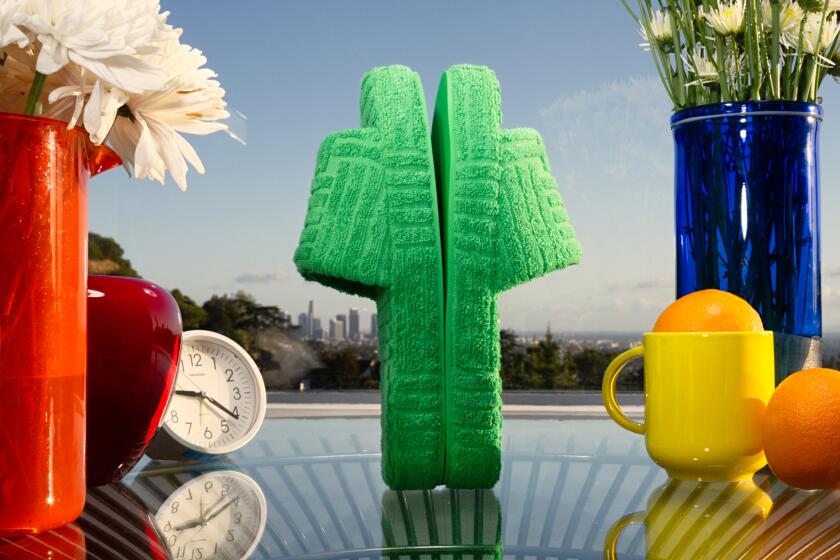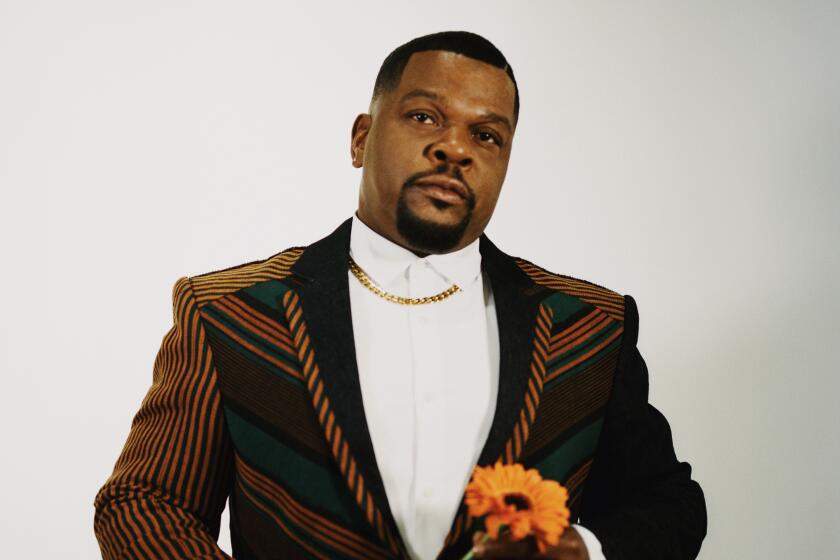- Share via
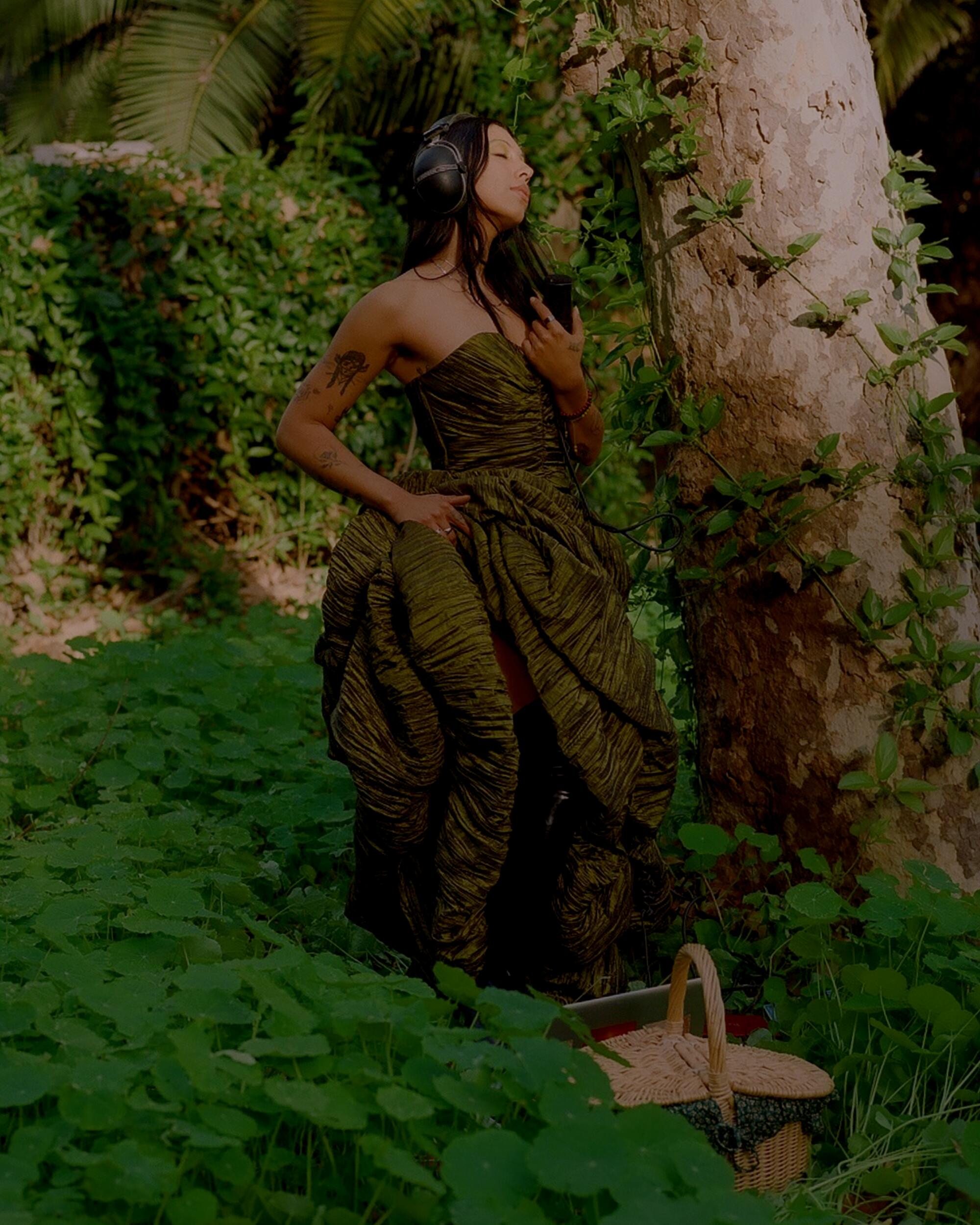
This story is part of Image issue 17, “Offering,” a special gift from L.A.’s creative community to a city that seemingly has it all. Read the whole issue here.
Mia Carucci answers the door with a 4-foot red-tailed boa named Selena wrapped around their torso. Carucci looks at ease in their purple camisole, green basketball shorts and house shoes. The smell of burning incense wafts through the open windows of their Victorian-style home in Northeast L.A. while a “forest playlist” murmurs softly in the background. Carucci’s dog, Larry, rescued from a South L.A. shelter, and cat, Luna, rescued from the streets of San Francisco, arrive beside their owner. “I got you this,” Carucci says before we go any further, handing me a multicolored Road Opener candle with rice, seeds and glitter sprinkled around the wick. Its purpose: “Receive Blessings that will help in your home, business and love.”
The candle is only the first offering that day. I follow Carucci to the kitchen, where containers of herbs line the wall. Like clockwork they start grabbing from their stash — mugwort, calendula, oat straw, chrysanthemum — a blend meant to essentially chill us out. The energy in the home Carucci shares with longtime partner and fellow artist Mario Ayala, who they describe as their soulmate, feels to me like a scene from “Snow White,” if Snow White was actually brown and a musician from Miami who could talk for hours about divinity and being an August Virgo. There are many animals, plants growing out of their pots, the air fresh from the rain.
In the time it takes for Carucci to steep the herbal blend into a tea at the dining table, we’re already elbows deep into a discussion that bounces from love to surrender to God to destiny. “I never have light conversations,” Carucci says. “This is just my life.”
I first learned of Carruci in 2018 through their work as a model and DJ, where for years they’d been playing the kind of sets that traversed genres and opened up new dimensions. At Boiler Room, at fashion parties like Heaven by Marc Jacobs where they opened for Deftones, at clubs and on tour with artists like Kali Uchis and Jorja Smith, they held court. There’s a performance-art quality to seeing Carucci play: Their personal style — something that could be described as irreverent goth — the way they seem so powerful in their physicality, all were part of the story they were telling with their selection. Sure, any DJ set could be potential grounds for spiritual awakening, but Carucci cultivated a sound that felt closer to a ritual than much of the trappy-chug coming out of L.A.’s club scene at the time. Their sets dipped into African drums, reggaetón, baile funk, cumbia, IDM, metal.
Their music, like their DJing, rejects genre constrictions and sometimes even reason. A singer and a producer, Carucci often blends natural sounds with electronic ones — a sonic collage that takes inspiration from their childhood, their spiritual practice, their Latin roots, Earth. When asked how they would describe their music, Carucci answers with a laugh: “No idea. I do not know.” Their music seems to draw from heaven and Earth — there’s a gauzy quality to many of the tracks, almost like Carucci blows air into them with the help of sharp electronic sounds, while others retain an intense groundedness through the use of instruments or a deeper range in their voice.
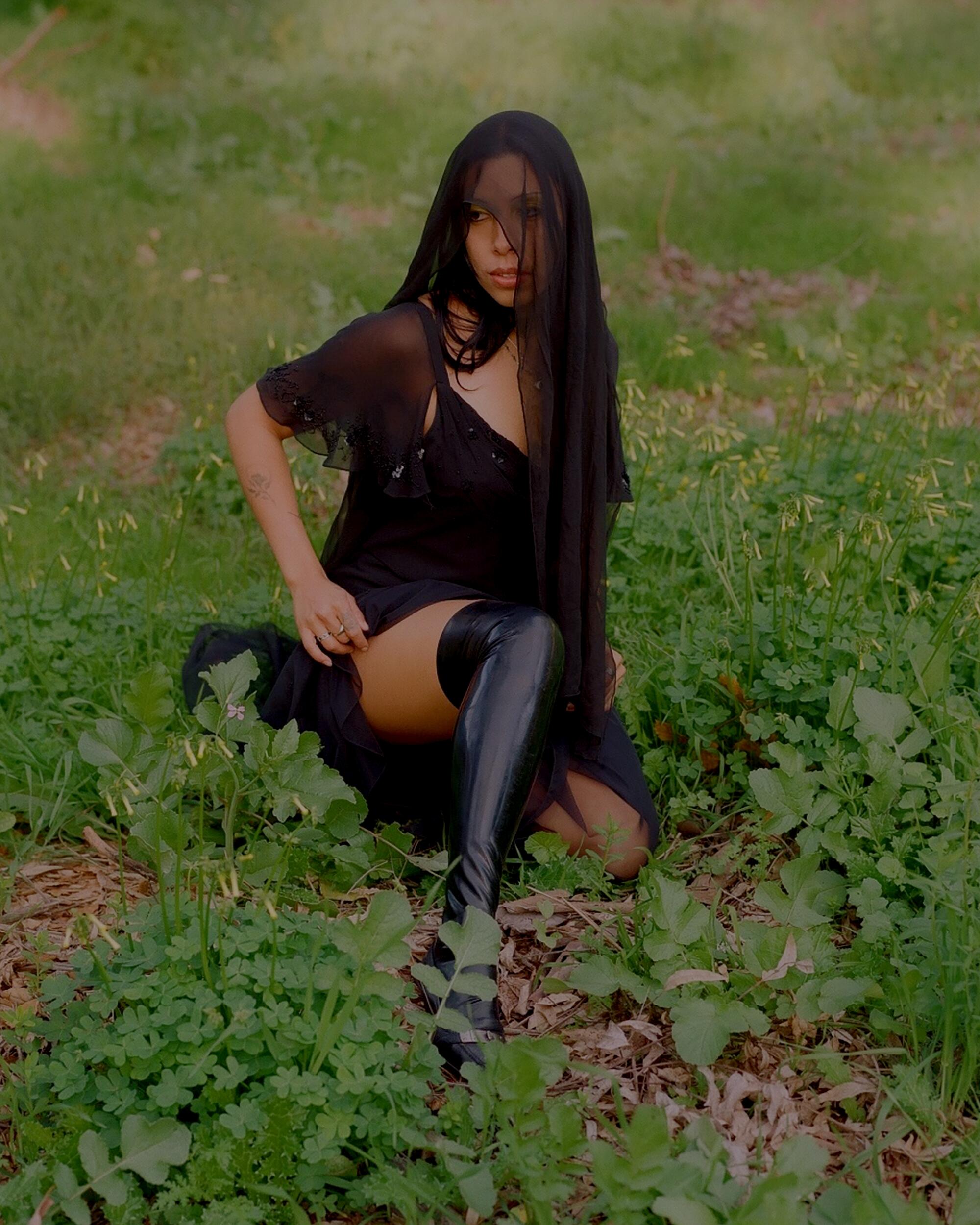
Their self-produced, self-written 2019 debut single, “Chimera,” a drum-forward track that served as both warning and incantation, takes its name from the fire-breathing mythological creature that has a lion’s head, goat’s body and snake’s tail. Carucci’s “La Loba” was a bloody “invocation to call upon the wild animal within.” Their debut EP, “As Above, So Below,” was an experimental invitation to the spirit world, with tracks that paid homage to dreams (“Primal Deep”) and an Afro-Brazilian sorceress and spirit (“Pomba Gira”).
Currently, Carucci says, they’re planted knee-deep in their forest era, driving out to the Angeles Forest or Idyllwild to record the echoes and whispers of the Earth and trees to use in their music. “Forest Floor,” a two-part project that Carucci released at the end of last year, is what they call their most vulnerable work yet. Its title track is ethereal, crisp and cool, with Carucci crooning in a way that evokes early-’90s shoegaze. “Twin Spines” infuses ozonic drum and bass with what sounds like wind.
Music has always been a means to connect with spirituality and the world for Carucci. A tool to spread a message. “If you really listen, all my music is about God,” they say. In February, Carucci released their new single, “Surrender,” a darkwave track that’s simultaneously about domination and submission — the push, pull and give in. The video, creative directed by Miwah Lee, shows Carucci in a head-to-toe latex catsuit spinning a red leash. It’s spliced with footage of them in the forest, laying among the foliage, digging their hands in the dirt. Carucci, in a warm, hazy command, sings about getting on your knees. “Everything I write is in relationship [to] surrendering to this entity that is larger than yourself.”
Carucci grew up as a “Tarzan baby” in North Miami Beach — running around with no shoes on the regular, obsessed with animals and being in nature. Carucci’s father is from Argentina (his mother immigrated there from Palestine by way of Egypt, and his father from Italy). Carucci’s mother, a freestyle dancer raised in the Bronx, is Puerto Rican with Taíno and African ancestry. Carucci spent a lot of time in São Paulo because their dad’s second and third wives are both Brazilian, and spoke Portuguese before they spoke Spanish. They identified in different ways at different times growing up (“I had phases,” they say. “That was my Libra moon.”). But they connected to disparate cultures through music. Carucci was exposed to Italo disco and ‘80s dance music by their dad, freestyle classics by their mom, samba music by their time in Brazil. Living in Miami as a teenager offered its own specific education. “A lot of my life was at night,” Carucci says. “I was 13 when I was going to raves at Space, scotch taping my boobs together. Dude, it was so f—ing hectic.” At 16 and 17, there were parties at the LIV or the W Hotel at least four times a week. After a while, though, going out became less about partying and more of a classroom.
They’d listen to these big touring DJs beat match and think: “I could do better than all these fools.” Eventually, they learned to DJ on vinyl. “I would cry, because getting two records to blend was so beyond my brain,” they say. “You know when you see something so clearly in your head and then you try to do it, and it’s nothing like that? It was driving me nuts. That is a character flaw: I have expectations of all things and then when they don’t turn out it’s like I failed.”
During their first few years in L.A., Carucci adopted Larry, a German shepherd, malamute, gray wolf and chow mix. They have a portrait tattoo of him on their index finger. “I’ve always related more to animals than humans,” Carucci says. “I’m kind of obsessed with human behavior because I feel very external from it. I run on code, respect, honor and honesty — very much related to the purity of the animal kingdom. I’m very primal in that way.” There’s something primal and animalistic about the music Carucci makes too. The yelps in songs like “La Loba,” which translates to “she-wolf,” mimic the animal’s song.

There are certain emotions Carucci says they don’t experience. Missing people is one. It’s not from a lack of love, but from them being extremely present. Another one is the feeling of being hyper-excited about their accomplishments — they experience nerves, stemming from the intense Virgo pressure to do things well, but happy, excited feelings aren’t a thing in their world. Even when they get news like they got in late January, that they would be the face of the new Nike X Ambush campaign, which was on a massive billboard above Penn Station near Madison Square Garden all of February, they remained level. One of Carucci’s favorite books, “The Bhagavad Gita,” states basically that the person who stays the same in moments of extreme happiness and extreme sadness is the person closest to God. “If I get a flat tire, I’m like, ‘Cool.’ I got approved for a huge budget? ‘Cool.’ For me, when I’m walking in my divine path, things that are happening are meant to happen,” Carucci says. “This is just part of my ascendance.”
Carucci’s passion is connected to their practice. Just ask Mario Ayala’s grandmother, Milagro Ayala, who is close with Carucci. Originally from Cuba, Milagro shares Carucci’s natural inclination toward spirituality — a regular topic of conversation between them. “Realmente, parece que sí: Mia puede hacer ciertas cosas dentro de su espiritualidad,” says Milagro. “Sabe lo que está haciendo con eso.” (“Truly, it looks like yes: Mia can do certain things within their spirituality. They know what they’re doing with it.”)
Carucci knows they’re powerful. “I’ve always been hyper-protected by a lot of things,” they say. But actually making music proved to be one of their biggest challenges. “It took a lot of healing and letting things go and evolving as a human and understanding the impermanence of everything to become OK with the fact that no one believed I could do any of the things I wanted to do,” Carucci says.
It wasn’t until the pandemic, after the release of “Chimera,” that they felt forced to confront the calling that had nagged at them since childhood. It was also around the time they started becoming more vocal about the things that bothered them. In retrospect, Carucci recognizes that their literal and metaphorical voices were intertwined — one couldn’t sing out loud if the other felt stifled. “I’ve been doing a lot of inner child healing, which really meant me speaking my mind,” Carucci says.
Five months ago, Carucci got a ponto riscado tattooed on their throat — a sigil meant to invoke specific work with the main god in the Afro-Brazilian religion they practice, known as Quimbanda and Umbanda. This particular sigil is intended to work with the voice and calls on the god known as Exu or Esú in Portuguese (also known as Elegua in places like Puerto Rico and Cuba and Legba in Africa). The sigil is said to encourage the articulation of thoughts and feelings and aid in making music. Getting the tattoo felt like a double-sided door opening. “I’m such an opinionated person, I have a hard time keeping it in,” Carucci says. “But my whole life I did. In the last two years, I’ve not only been finally singing but also fully unfiltered about my feelings and my thoughts, and sharing them actively.”
Carucci signs their emails “Sent from God.” They believe that God is in all of us, in everything. It’s the steam in the tea we’re drinking at their table, or the energy shift that happens when Larry joins us in the room. There’s a constant recognition of the ways God shows up, and how to honor that in real time.
In “Surrender,” Carucci’s latest single, they’re the one at the altar being worshiped. To make the track, Carucci tapped Philadelphia producer Estoc, whom they found on SoundCloud. When they heard the music, the words poured out of them. “How do I challenge myself to write about God on this darkwave track?” Carucci says, reflecting on that process. “God is everywhere. God is in everything. So I’ve pushed myself to make that fit into everything.” The lyrics dig into the dissonance between wants and needs, and the struggle of tethering those two things together in a way that makes sense. “They don’t become cohesive until you surrender to something bigger than yourself, in my experience.”
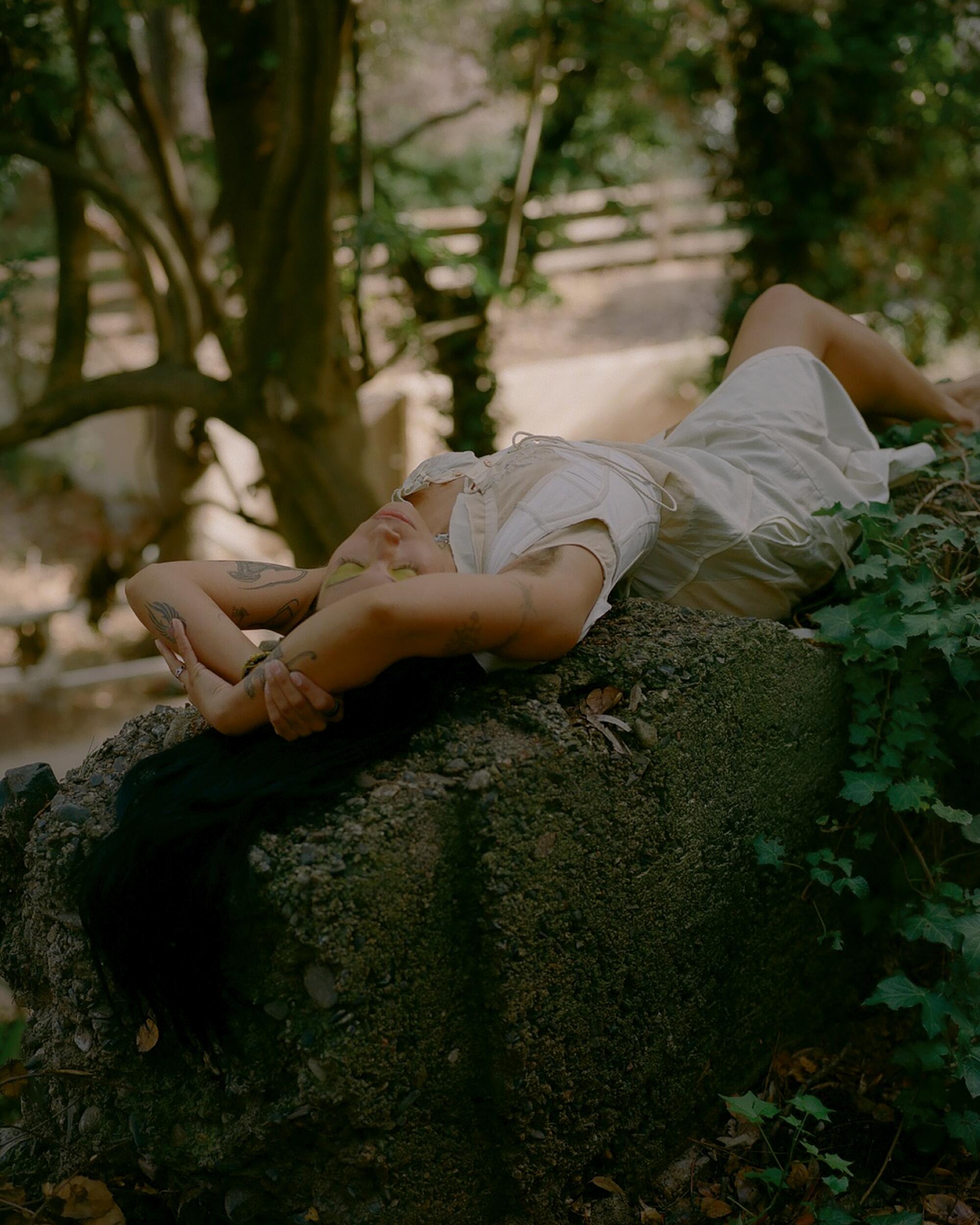
There’s a boldness to Carucci’s persona both online (on platforms like Instagram) and IRL that feeds the imagination of their audience. But sitting in front of me at their kitchen table bare-faced, wearing slippers instead of platforms and an open demeanor, they tell me: “I’m an incredibly warm and nurturing person. But it takes vulnerability on the other end to get that from me.”
“Surrender” builds on this idea of being both dominant and submissive, how every person has both traits within them. In their artistry and inner world, Carucci flips back and forth between the giver — in a DJ booth, onstage performing their music, in their new video yielding a nuzzle — and the receiver — in their spiritual practice, relationships, school of life.
On my way out, they remind me not to forget my candle. And maybe an hour after I leave, I get a voice memo from them:
“Now I’m thinking about it a little longer. You know how you were saying that, in not so many words, I present a different way than I am maybe in person? We think about August Virgos that are musicians, like Elizabeth Fraser of Cocteau Twins, Shirley Manson of Garbage, Michael Jackson ... soft-spoken, very internal people that you don’t know that much about in real life. (Also very opinionated people.) But in real life, they’re very calm, thoughtful people, and in their music and onstage their external persona is very large. I think once I knew that about those people as well, I realized that I wasn’t alone. I think that is also a huge trait of August Virgos, that is law.”
